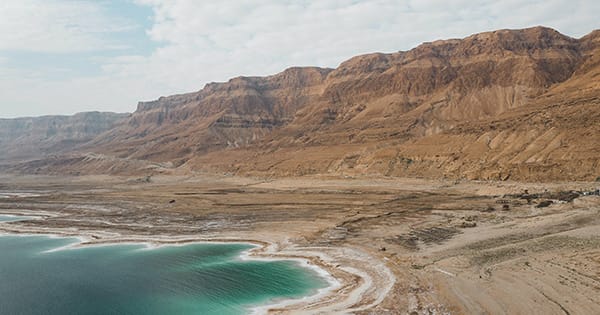In this course you will explore the vital relationship between the geography of the Bible and its meaning. You will appreciate how location, water, weather, roads, and culture are vital elements that convey meaning in God’s story.
- Explain how the geography of the Bible influenced the biblical writers’ lives, language, and cultural context.
- Recognize the important role that physical, natural, and human geography play in the meaning of Scripture.
- Integrate geography into your Bible reading and interpretation.
-
This class is packed with a good understanding on how geography plays an important role in the Bible.
-
Excellent course.
-
I am hereby telling my brethren to really be encouraged that this course is very impactful and very interesting for all the Bible students.
-
The study of geography enhances further knowledge of the Promised Land.
-
I've never considered geography in my quest for understanding of Old Testament. I now see the importance of geography in the promised land.
-
Great to enhance Bible study
-
It is excellent.
-
This course is well worth taking to better understand the culture and way people made decisions in the Bible, based on the geography, weather and seasons of the promised land.
-
The content of this class made the meaning behind Scripture related to geography come to life! I have already used some of the content to encourage my small group members.
-
Muy bueno
-
This course has helped me understand and apply the importance of geography when reading and studying the Bible. I have been helped very much and enjoyed the information given. Good teaching too.
-
The course helped me to correlate the stories in the Bible with the physical setting and the economic and political circumstances that influenced the events.
-
I learned a great deal about the different types of geography in the Bible, and how it affected the ancient people.
-
Thank you for offering this course! I am new to the ARTOS content and chose this course to begin my self-directed studies to increase my understanding of Israel not only from a biblical perspective, but also in view of current events with the outbreak of war these past few weeks. I appreciated that the format was organized into short lessons that I could easily fit into my schedule and found the content and visuals very helpful to retain what I learned.
-
Very informative, I have never looked at the Bible in this perspective before.
-
Thank you so much for offering this course! I really enjoy learning about the geography of Israel. It has helped my Bible reading so much.
-
I enjoyed every minute of this course. It has already helped me to gain greater understanding when reading my Bible.
-
I attended a Christian college and have also taken many online courses in Bible and theology. That said, I found this course to be one of the most interesting I have ever taken. Rather than focusing on the people and events, it gave me a background of why certain things happened where they did and also explained the effect geography had on the daily lives of the Bible characters. Excellent course which was very valuable to me.
-
Great course. I especially like the visuals and biblical references to the material covered. I learned a lot about geography in my Bible.
-
Dr. Beck is clear, concise, and delivers new information on a level that makes it interesting and easy to comprehend.
-
At first, I was skeptical as to where this course was going teach me. It was fantastic. It makes the Bible come alive for me. I bought “The Basic Bible Atlas” by Beck. It helps visually with wonderful colorful maps. I went to church and one of scriptures had a place…I knew what happened there and the other things that happened there as well.
-
Totally blown away!!! I've spent my learning about the people, culture and various gods of the inhabitants of the land. Now I understand why the people worshiped these gods--for rain, for their existence in the land and for fertility--both crops and people. Killing their children is the ultimate sacrifice to obtain the favor of their gods. People there were desperately dependent on the weather report and results.
-
Very interesting and not studied before, but important for understanding the different cultures.
-
This was a very interesting subject. I brought out things that I never would have considered as I studied the Bible. Great Job!!!
-
I very much enjoyed this course and can now see links to things in Scripture that I did not think about before. This course also made me more interested in studying the geography of Bible times more and maybe someday travel to the area.
-
Enjoyed the course and the instructor.
-
Dr. John Beck did an excellent job presenting the Biblical Geography Basics course. The professor made me feel as if I were there with him, and all I could think was, "Wow! How cool is this to be in the Lord's city without having to travel directly to these places." Dr. Beck helped me develop my mental map.
-
I really appreciated how clearly engaged with the content the instructor was. It was obvious he cared about his craft, ministry, and students. I enjoyed watching his delight as I learned. Thank you!
-
I can already anticipate and am experiencing how this course is enhancing my enjoyment and fruitfulness of Bible reading and study by giving me a much clearer mental picture of subject matter I’d previously glossed over or shrugged my shoulders at. The professor and his lectures are stimulating and inviting. Blessings!
-
This course was super interesting. Mr. Beck brought an excitement to the lectures that increased as the lessons went on. I thought geography was all about the placement on a map but I learned how human geography and culture is intertwined within geography. I look forward to trying to arrange my studies geographically and discovering the hidden treasures.
-
An excellent course!
-
Excellente
-
Keep up the fantastic work! :-)
-
This was my 6th course. I'm never disappointed!!
-
I enjoy the course. It does give a new perspective in Bible understanding.
-
I enjoyed this course. Learning the geography has helped me grasp a better understanding of the Promise Land.
-
This course provided me a new insight into the Bible that I never had before until now. I have a new perspective and interesting about the Bible. Thank you Doctor Beck !
-
Geography is probably a topic I would not have considered the importance of greatly before. But this course has definitely enriched my Bible-reading experience and has changed the way I read the Bible forever. It’s like going from black and white to colour. I’m understanding and noticing more. Thanks for a wonderful course.
-
Thanks so much for the comprehensive course to under the geography of Bible times. It surely helps me to increase my understanding of and interests in studying the Bible. It furthers my perception of God’s love and plan for His people.
-
This course opened my eyes to looking at the Bible in a completely different way. It really gives me a better context when studying the Bible.
-
Very enlightening. This was a topic I had never really considered before, but now I have more knowledge, awareness, and interest in it. I believe this will enhance my Bible reading. I am grateful.
-
Excellent course: well written, visually appealing, stimulating. Thank you for offering these programs!
-
The lecturer put forward the information in a dynamic and interesting way, presenting the facts on the videos with education photos and clips that helped me to place the information within the setting. This course has helped me to understand Biblical geography and I will use what I have learned in my study of the Bible.
-
This was great for a basics course. I hope more of these courses become available . I will definitely purchase one of the geography books offered.
-
I've always felt that the Bible had geography in it however, this lesson enhances my knowledge of the Bible as well as teaches me the different ways I can study and understand Gods Word. This course has given me great tools in studying the Bible deeper and has made me more aware of the connections of geography between the Old and New Testament. It has opened my mind and conscience to paying more attention as I read the Bible as in paying closer attention to the geography in the text. I have seen how geography shows the importance to what God really wants us to know.
-
I am now getting a better understanding of the Bible because of this course. In some readings/studies of Bible passages I am getting much more out of the verses than I got in previous readings. Geography is definitely an important part of Bible study.









